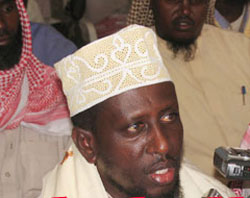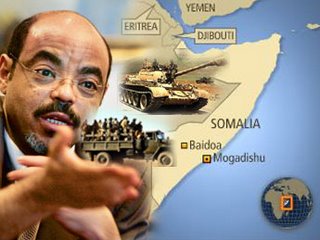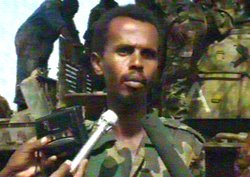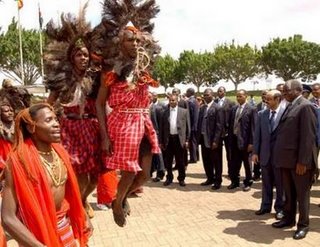
Dec 5, 2006 — In the horn of Africa the daily occurrences are faster than one could follow. At a time hopeful events occurred, and at times all the hopes diminishes. Therefore, it is vital for the peoples of the region to keep their esteems up-ward, as there will always be a hope at the end of the tunnel there is always a light!Starting from the very volatile nation without any central government for more than fifteen years, since the collapse of former President Siad Barre, in 1991. Clan based power of warlords took the country into chaos. Within the capital city, Mogadisho there were more than five clan-doms. Fear, lawlessness, was everyday life for the citizens. The whole nation brake down into self proclaimed states. As the current chaos continues some neighboring countries are encouraging the breakaway states of disintegration, which have vested interested in weakened and lawless Somalia.Never the less there is a deem light coming out, if the Somalis are able to tighten their belts and come to regain their independency, the fragile but deem light could lead them to the ever-lasting peace. This everlasting peace though cannot be achieved without paying the necessary price that is courage and sacrifice for the good of the people. Sacrifice not necessary mean to give once life, but to be self less. The intrusion and interference of United States and Ethiopia however, will make it more difficult, but it is still possible that the Somalis themselves can achieve what they want.The Sudanese people are passing through very challenging but fruitful period. The peaceful solution of Southern Sudan conflict, which was the cause of loss of hundreds of thousands of innocent lives, and destabilization, displacement, and other horrible impacts on the citizens, has brought impeccable peace in a civilized manner, have given a relief and hope to the whole region. Nevertheless, the reached peace agreement undoubtedly needs to be nurtured with implementation of the sprit of the intended goal. It has been marked some hick-ups here and there, although it is natural, however, it needs responsible solutions on timely manner. It is a relief to mark that the sole people who fought against each other are now working together for the same goal that is peace for all. Another equally important peace agreement took place recently solved the Eastern Sudan conflict. This agreement did not only solve the conflict of the East, but also took place with no external interference of any kind. Such a process will be very helpful on implementing the agreement with less or without obstacles. Sudan is now left with one but very important and dangerous conflict to solve. The Darfur conflict! Undoubtedly, the Darfuris suffers are unacceptable. The peace loving multicultural and multi race, known to be so kind people, should not allow this to happen. Sudanese are known to be very kind and generous people. Neighbor nations Eritrea, Libya, and Egypt are trying to bring this highly publicized and very sensitive to the well being of the whole nation. Sooner than later bringing the highly wanted peace is a win-win situation to the Sudanese people and the whole continent.Neighboring Ethiopia, after the fall of dictator Mengistu Hailemariam, the hope reached at its highest barometer, that Ethiopia is going to be the bacon of peace, tranquility and prosperity. People hoped that will be the end of seeing Ethiopian suffer and misery. The EPRDF the united front of all Ethiopians that include, the Tigres, Amharas, Oromos, Somalis, and other nationals, helped by the EPLF, the Eritrean peoples liberation front, took over the government in 1991. Soon the Tigrai dominated front systematically ejected or undermined the ones comrades in fighting for the same cause to free and democratize Ethiopia, starting from the Oromos, Amharas and others. The regime led by PM Meles Zenawi, have fully focused on Tigrai regions sole benefit at the cost of other regions. The TPLF’s dream of a separate independent Tigrai is still intact to date. To realize their dream, they annexed chunks of fertile lands from Wolo and Begemider regions. They even crossed international boundary, to annex a sovereign Eritrean land, which triggered to the unwanted war of the neighborly nations. The war that started in 1996 was a great miscalculation by the TPLF led regime in Ethiopia. Washington Times’ in one of its articles, “ Ethiopia lost more than 70 thousands lives with nothing to show for such large sacrifice.” This animosity was supposedly to be solved under the court ruling, which both Eritrea and Ethiopia agreed under the “Algiers agreement” signed in December 2000. Under the agreement the commission made up five prominent judges was established to rule the conflict.Article 5 No. 17 of the agreement stated as follows: “Decisions and awards of the commission shall be final and binding. The parties agree to honor all decision and to pay any monetary awards rendered against them promptly.” While on April 2002, a clear verdict was awarded, unfortunately, the TPLF regime did not uphold the agreement to date, while Eritrea fully believed and adhered to the agreement.Ethiopia, due to amateurish immature government, now the country is under high political stress. The Oromos, the Amharas, the Somalis and other nationals are fighting against the minority regime. If it were not with the extended help of the WEST the regime in Ethiopia would have collapsed. Not only that, the supposedly democratic election for a government that took place last year, the regime in power did not want to accept the out come. The winners of the election are currently lingering in the prison cells, under a treason charge, the charge that is punishable to death under the countries rule.The current Ethiopian situation is seriously dangerous, for the whole region. Ethiopia is fully intervening in inter Somalia conflicts, besides occupying Eritrean, Sudanese, Somali, and Kenyan sovereign lands.This newly emerged country Eritrea was under chain of colonies until 1991, wining the war against Ethiopia’s at the time Africa’s most powerful army. Eritrea took its legal time to officially proclaim its independence. In 1993 under the observations of UN, OAU and others, Eritreans voted 99.85% for independence. With that Eritrea became an independent nation, in May 24, 1993.The hard working Eritreans, unlike other newly emerged nations or nations recovered from war, they did not get any help. No nation-raised funds to assist or rehabilitate its collapsed economy and infrastructure. To the contrary, Eritrea fully relied on its citizens with in Eritrea and the Diasporas. The unwanted second aggression of Ethiopia that started in 2006, have interrupted to certain degree the acceleration of its economic recovery. Nevertheless, these hard working people, while defending their sovereign nation they are also fully involved in nation building. Eritrea has built more schools, hospitals, roads, bridges, and colleges during these challenging years than its peacetime of five years. While some very important political process has been halted, giving priority to national safety and security, it is the will of the people and the government that Eritrea became the beacon of democracy, by the people to its people with out any pressure or to please any other but its own people.Eritrea’s stand on Somali conflict is very clear. While admitting the Somali people’s help for Eritrea’s independence during the struggle, it is very important that the Somali people should solve their problem without any foreign intervention(s).The brotherly people of Sudan have contributed undeniable assistance during the struggle for Eritrean independence. Eritrea is well aware that peace and prosperity of brotherly people of Sudan is tantamount to its own peace and prosperity. Therefore it takes as its own peace when Sudan realizes full peace. It contributed to the Southern Sudan conflict, as it played a major role assisting to solve the Eastern Sudan conflict. It is openly extending its will to contribute to the Darfuri conflict’s solution. Eritrea is enjoying Djibouti’s friendly neighborliness. Both nations have signed protocols that bring both peoples even closer.In regard to Ethiopia, the people of Eritrea made it clear that it is only a peaceful way based on mutual respect that is enabling us to live as neighbors, rather than enemies. Eritrea have extended its hand of peace, at the end of the war for independence, although the country has been destroyed to ashes, and over 65,000 Eritreans lost their lives due to the barbaric act of the regimes in Ethiopia.Eritrea always maintained that “Only the ruling elite is the enemy of Eritrea, not the people.” The same holds even now.The small nation Djibouti, being very strategic and important nation is playing bigger roll on stabilizing the region. It is the only nation that maintained peace and friendship with all its neighbors. It is also the nation that solved it is internal conflicts in a civilized manner citing in a round table. A democratically elected government is a great example to nations surrounding it.Knowing better and more than any other nation(s) Djibouti, have tried to bring the Somali brothers together, and even hosted to the point that gave a little hope on establishing a transitional government. Djibouti, at this time maintains its full support to united Somalia, and united government.Its roll in IGAD is remarkable. Although, IGAD is not as functional as each of the member nations citizens wanted it to be, due to conflicts of Eritrea and Ethiopia and Somalia’s fragile situation.




























